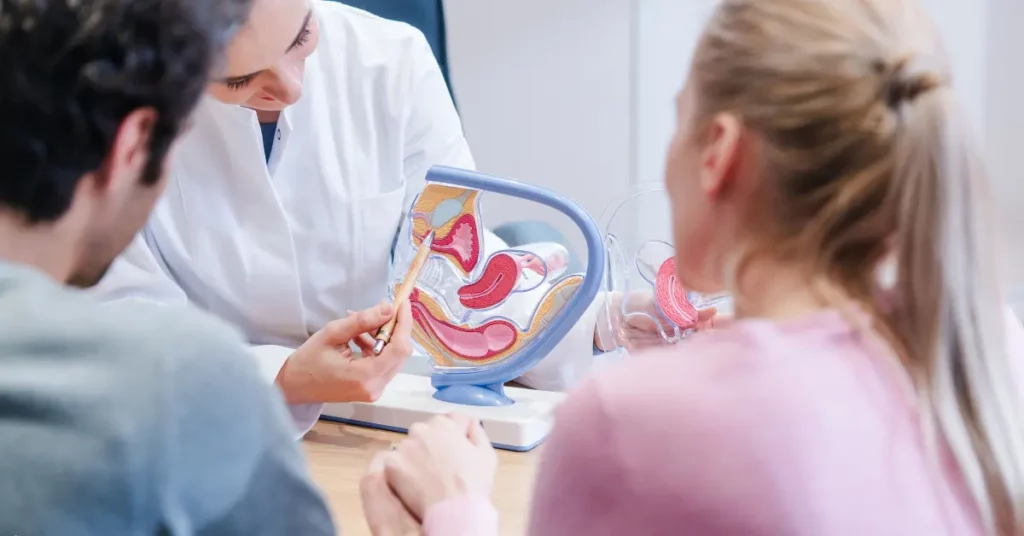Having a child in your 40s is becoming more common, thanks in part to fertility treatments like IVF. Women over 40 are now the fastest-growing age group of new mothers in the U.S., with over 4% of all births in 2023 occurring in this age range. If you’re considering in vitro fertilization (IVF) at this life stage, it’s essential to understand both the challenges and possibilities. This article will discuss how age impacts IVF success, what realistic outcomes to expect, and key strategies to improve your chances. While IVF is the most effective fertility treatment after 40, success is never guaranteed. But with the right approach and support, many women in their 40s do achieve the family they dream of.

Impact of Age on Fertility and IVF Success
Age is one of the most decisive factors in fertility. People often ask about the best age for IVF or wonder the best age to do IVF. Biologically, a woman’s 20s to early-30s are ideal for conception – fertility is at its peak, and eggs are plentiful and healthy. By contrast, fertility begins declining in the mid-30s and drops sharply after 40. Women 40 and above have significantly lower fertility potential than younger women, and even with IVF, their success rates are substantially lower. The natural monthly pregnancy rate at 40 is approximately 5%, and it decreases to nearly 1–2% by the mid-40s. In short, age matters: IVF can still help women over 40 conceive, but it cannot fully overcome the natural age-related decline in egg quantity and quality.
Chances of IVF After 40: Success Rates by Age
The IVF success rates by age 40 and beyond drop dramatically compared to younger patients. According to national IVF statistics, at age 40, the average live birth rate per IVF cycle is only about 15–20%, compared to around 40% for women under 35. This decline accelerates with each year in the 40s. By age 43, the chance of a live birth from one IVF attempt is down to roughly 5%. By age 45 and above, success with your own eggs becomes exceedingly rare (often below 1% per cycle). These figures underscore that IVF in the early 40s has modest success rates, and by the mid-40s, the odds are very low if using one’s own eggs. Every individual is different, but it’s critical to approach IVF after 40 with realistic expectations based on these statistics.
Why do IVF success rates plunge for women over 40? The answer primarily comes down to egg quality after 40. Both the quantity and the genetic quality of a woman’s eggs decline as she ages. By age 40, the vast majority of a woman’s remaining eggs are not chromosomally standard. These age-related genetic issues lead to lower fertilization rates, poor embryo development, and higher miscarriage rates even if implantation occurs. In essence, older eggs have a much lower chance of producing a healthy baby. Diminished “ovarian reserve” also means IVF yields fewer embryos to choose from. While egg quantity matters, it’s the steep drop in egg quality that most limits IVF success after 40.
Realistic IVF Expectations After 40
Given the challenges above, it’s crucial to set realistic IVF expectations after 40. One important reality is that you may need multiple IVF cycles to achieve a successful pregnancy. It’s uncommon to succeed on the very first try at this age. Those aged 40–41 had only about a 13% chance of having a baby after one IVF cycle, but about a 25% chance after three cycles. Undergoing two or three IVF attempts significantly improves the overall odds of taking home a baby. Patience and persistence are often necessary parts of the journey. It can be emotionally taxing to go through repeated cycles, so prepare yourself for that possibility from the outset.
At the same time, know when to reassess your plan. Doctors typically advise women over 40 to be proactive and not to “waste” precious time. If a few cycles with your own eggs aren’t successful, it may be time to consider alternate approaches. Having open discussions with your fertility specialist about prognosis and timeframes can help manage expectations. Be kind to yourself emotionally: IVF at any age can be stressful, and especially so in one’s 40s when the stakes feel high. Seek support, whether through counseling, support groups, or leaning on your partner, friends, and family. Staying mentally resilient and hopeful will help you navigate the ups and downs of this process.
Lifestyle Optimization and IVF Preparation Tips
While you can’t change your age or your genetics, you can control your health and habits. Here are several IVF preparation tips to help your body be in the best shape possible for conception in your 40s:
- Healthy Diet: Eat a nutritious, balanced diet rich in vegetables, fruits, lean protein, whole grains, and healthy fats. Some evidence suggests a Mediterranean-style diet supports fertility. At a minimum, a nutrient-dense diet can improve overall health and may positively influence egg quality and implantation. Also, ensure you’re taking a prenatal vitamin with folic acid, and ask your doctor if other supplements (like CoQ10 or vitamin D) are appropriate for you to support egg health.
- Maintain a Healthy Weight: Being either significantly overweight or underweight can reduce IVF success. Aim for a healthy BMI through a combination of moderate exercise and a balanced diet. Regular light exercise can improve blood flow and reduce stress. Avoid extremely intense training or long-distance running during IVF, as very vigorous exercise might impair implantation.
- No Smoking, Limited Alcohol and Caffeine: If you smoke, now is the time to quit – smoking accelerates egg loss and is linked to lower IVF success and higher miscarriage rates. Heavy alcohol intake is also detrimental to fertility, so it’s best to minimize alcohol consumption. Likewise, keep caffeine moderate during IVF and pregnancy.
- Stress Management and Sleep: Managing stress is essential for your well-being during IVF. High stress doesn’t necessarily prevent pregnancy, but it can lead to unhealthy behaviors and make the journey harder. Use stress-reduction techniques that work for you, such as meditation, mindfulness, acupuncture, gentle yoga, journaling, or talking with a therapist. Ensure you get plenty of sleep each night to allow your body to recuperate. Emotional self-care is part of preparing for the demands of fertility treatment.
- Medical Check-ups: Before starting IVF, get any recommended medical evaluations. Manage chronic conditions as tightly as possible with your physician. Make sure your OB/GYN has screened you for any issues that could affect pregnancy. Having a thorough check-up and bloodwork can catch and correct problems that might hinder success. Discuss with your doctor if any medications or herbal supplements you take could interfere with fertility.
- Timing and Compliance: Once you begin an IVF cycle, follow your medication schedule and clinic instructions to the letter. Missing doses or timing injections incorrectly can compromise the cycle. Attend all your monitoring appointments for blood tests and ultrasounds so your doctors can adjust your protocol if needed. Essentially, being diligent and well-organized throughout the cycle will give you the best chance of success.
You set the stage for the best possible outcome. Good lifestyle habits improve your overall fertility and may even marginally improve your IVF success over 40, or at least prevent additional fertility obstacles on top of age.

Strategies to Improve IVF Success After 40
Even with perfect health and preparation, women over 40 often need additional help to maximize IVF success. Fortunately, reproductive medicine has advanced, and there are specific strategies for IVF after 40 that can markedly improve the odds. Below are some key approaches your fertility team may recommend:
- Preimplantation Genetic Testing (PGT-A): This is a technique where a few cells are biopsied from each embryo and genetically analyzed before transfer. PGT-A allows doctors to identify embryos with normal chromosomes (euploid embryos). Transferring a chromosomally normal embryo greatly increases the chance of implantation and lowers the risk of miscarriage. Older women produce a higher proportion of abnormal embryos, making PGT-A extremely valuable in identifying the viable ones. While PGT-A doesn’t improve the intrinsic quality of embryos, it helps ensure that you transfer an embryo with the best possible chance, thereby avoiding wasted transfers of non-viable embryos. This can save time and heartache when IVF resources are limited.
- Choose an Experienced Fertility Clinic: Look for a fertility clinic for IVF that has experience and success with older patients. High-quality clinics offer comprehensive fertility clinic services, including advanced laboratory techniques (ICSI, assisted hatching), rigorous embryo culture conditions, blastocyst transfers, and expertise in genetic testing and third-party reproduction. The expertise of the embryology lab and physicians can significantly impact success rates. It may also be worth consulting a clinic that encourages innovative protocols for patients with low ovarian reserve. For instance, IVF Center Hawaii (Fertility Institute of Hawaii) offers personalized care and advanced reproductive technologies to patients in their late 30s and 40s, helping to maximize the chances of success with tailored treatment plans. Choosing a clinic you trust, with proven outcomes in your age group, is an important strategy when pursuing IVF over 40.
- Consider IVF with Donor Eggs: Using donor eggs is often the most effective strategy for women in their mid-40s or those over 40 with inferior egg quality. IVF with donor eggs means the eggs come from a younger woman (often in her 20s), which largely bypasses the age-related decline in fertility. Many women over 40 ultimately turn to donor eggs after trying with their own eggs, and it has enabled countless individuals to have healthy babies. Of course, using an egg donor is a very personal decision involving emotional and ethical considerations. It may not be every couple’s preferred path, but from a medical standpoint, it is a proven way to achieve much higher success in this age group. If your doctor advises that your chances with your own eggs are extremely low, it’s worth discussing donor eggs as an option. Remember that using a donor egg still allows you to carry the pregnancy and experience childbirth, and the child will be biologically related to the father or to both parents in the case of embryo donation.

Pre-Embryo Transfer Tips for a Successful Outcome
Once you’ve gone through stimulation, egg retrieval, and embryo development, the final hurdle is the embryo transfer. The period immediately preceding and surrounding embryo transfer is crucial for successful implantation. Here are some pre-embryo transfer tips to maximize your chances of success:
- Follow Your Medication Protocol: Leading up to the transfer, you’ll likely be on medications to prepare your uterine lining. Take all medicines exactly as prescribed and at the exact times each day. Proper lining support is essential for the embryo to implant. If you’re unsure about any instructions, double-check with your clinic well before transfer day.
- Stay Relaxed and Comfortable: Embryo transfer is typically a quick and painless procedure, but arriving with a calm mindset can help. In the days leading up to the transfer, try to minimize major life stressors if possible. During the transfer, you’ll need a moderately full bladder to help with ultrasound visualization, so drink fluids accordingly. After the transfer, most doctors advise taking it easy for the remainder of the day. Light activity is fine, but avoid strenuous exercise or heavy lifting.
- Optimize Blood Flow: In the days prior, keep healthy circulation to the uterus. Stay warm and avoid activities that could constrict blood flow. Gentle movement, like short walks or light stretching, is good, but don’t overexert yourself. Stay well-hydrated. Some women swear by foods like warm soups or wearing socks to “keep the uterus warm.” Whether or not this directly affects implantation, the general idea is to maintain a nurturing environment for the embryo.
- No Harmful Exposures: Continue to avoid smoking, alcohol, or any substances not approved by your doctor. Avoid hot tubs/saunas or overheating your body around the time of transfer, as excessive heat isn’t ideal for early pregnancy. It’s also wise to avoid introducing any new chemical exposures. For example, refrain from starting to paint your house or using strong cleaning solvents during this sensitive window.
- Emotional Care: The two-week wait after transfer can be one of the hardest parts of IVF. Before the transfer, prepare some strategies to cope with anxiety while you wait for your pregnancy test. Plan gentle activities, have people to talk to, or use relaxation techniques to keep calm. Try not to symptom-spot too intensely. Stay hopeful yet grounded, and lean on your support network to help you through these challenging days.
While statistics and probabilities can sound discouraging, remember that they are averages, not individual destiny. You are more than a number, and many factors play into each person’s fertility story. Stay proactive and keep the hope alive. Whether your path leads to a successful IVF with your own eggs, using a donor, or another route altogether, there are many ways to build a family in your 40s. With realistic expectations and innovative strategies, IVF can still offer a fulfilling route to parenthood after 40. Every step you take brings you closer to the family you’ve envisioned – and that success, when it comes, will make the journey worthwhile.
Sources
- Victorian Assisted Reproductive Treatment Authority – “How likely are you to have a baby after one, two, or three IVF cycles?” (VARTA, 2020 data analysis)
- NBC News. (2025, March 18). U.S. fertility rates are down for teens, and women in their 40s are more likely to be first-time moms.
